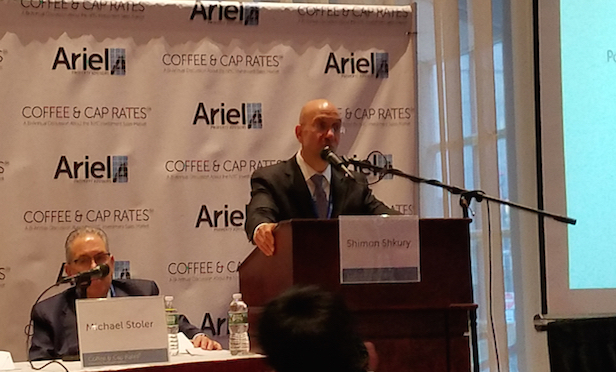
NEW YORK CITY—“We believe in two things in terms of real estate. We believe in water views and transportation,” said Adam Mermelstein, managing member at Treetop Development, and a panelist at the Coffee & Cap Rates program hosted by Ariel Property Advisors at 101 Park Ave.
Water and Transportation (But Not Staten Island)
The moderator, Michael Stoler, managing director at Madison Realty Capital, noted “Coney Island is at least a one-hour schlep.” Yet developers are constructing major buildings right near the Cyclone. Stoler referenced John Catsimatidis' huge multi-building, mixed-use development under construction on Coney Island.
Mermelstein endorsed the investment saying Coney Island offers water and a beach lifestyle that is outside the hustle-bustle of New York. Yet the neighborhood is still a bus or train ride to Midtown Manhattan.
Stoler noted there are some areas that are not on the radar. Seventeen years ago, no one was going into Long Island City. So where are the next big opportunities?
Staten Island has water views and transportation to Manhattan, but panelist Joseph Pistilli, CEO of Pistilli Realty Group and chairman of the board of First Central Savings Bank, openly asked if there was a real estate stigma in Staten Island preventing the kind of population explosions occurring in Brooklyn, Queens and the Bronx.
Panelist Seth Weissman, the founder and managing member of Urban Standard Capital, said he had family in Tottenville. However, his company did not own or intend to own in Staten Island.
421(a) Affordable Housing (Outside Manhattan)
In developing 421(a) affordable housing, Mermelstein explained there are advantages to building in the Bronx. With a 70/30 or 80/20 market rate to affordable units ratio, the rent differential between the market rate and subsidized rate in the Bronx is not all that great. However, in Tribeca, the rent differential would be tremendous. If market rate is approximately $45 per square foot, and for the affordable units $40 per square foot, the rent differential will not affect the economics very much.
Renovated Middle Market Niche Avoids Concessions
As Treetop Development has real estate in Queens, Brooklyn and Upper Manhattan in Washington Heights, Mermelstein has seen rents drop as much as 15%. However, coming closer to Harlem, and in Queens or Brooklyn he has observed no concessions.
Concessions depend on specific properties and location. Treetop focuses on the middle market, not the luxury market and not the four-story, unrenovated walk-up. “We are trying to deliver a quality, clean, nice, quasi-luxury apartment in most of the time a pre-war elevator building,” said Mermelstein.
With this niche, the developer has been able to charge 20% to 25% below the luxury market but still have a nice premium compared to the lower end apartments. Thus, Treetop has not been having to provide concessions with this product.
Alternative Financing Abounds
Urban Standard Capital comprises three businesses: ground-up developments of for-sale condominiums; renovations and repositioning of existing buildings; and specialty finance, senior bridge loans, mezz loans, and preferred equity. The financing branch has become the most robust part of the company's business.
Weissman says as conventional lenders in the market are hamstrung by Dodd-Frank related regulations, they are not lending or are lending at much higher prices, which has created a void in the marketplace. This has allowed companies such as Urban Standard to make loans or preferred equity investments. With their development expertise, they understand the assets, and have been able to earn equity level returns with credit level risks.
Interest Rates Are Rising So Strengthen Your Banking Relationships
Mermelstein has observed interests rates have risen as T-bill rates have gone up. “Traditional lenders, the most active lenders in the New York City market have raised their rates to about 4% on a five-year basis. Previously, we were borrowing at 3 3/4%, at times even 2 7/8%,” says Mermelstein. “So, we've definitely seen an uptick in the interest rate.”
However, Treetop does not deal with a large range of banks, instead preferring to build relationships with their go-to banks—with both their deposits and loans. As the company is opportunistic by nature, it buys assets, improves them, raises NOI and sells off assets. Thus, they look at five-year terms for loans.
© 2025 ALM Global, LLC, All Rights Reserved. Request academic re-use from www.copyright.com. All other uses, submit a request to [email protected]. For more information visit Asset & Logo Licensing.








